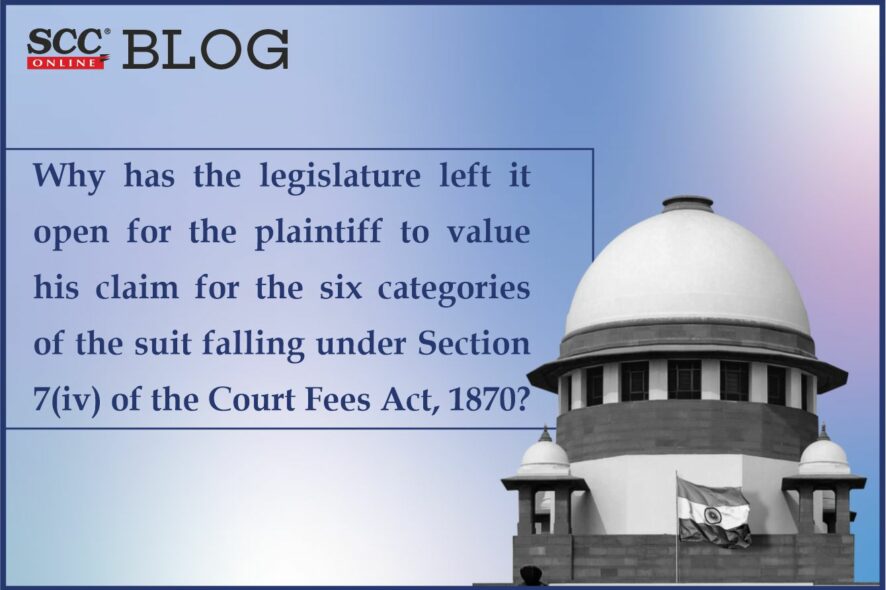Supreme Court: In case relating to court fees, the bench of Dinesh Maheshwari and Vikram Nath*, JJ had the occasion to explains why the legislature had left it open for the plaintiff to value his claim for the six categories of the suit falling under Section 7(iv) of the Court Fees Act, 1870.
Section 7 provides for computation of fees payable in certain suits. Sub-clause (i) refers to Money Suits which includes suits for damages, compensation, arrears of maintenance, annuities or other sums payable periodically where the fee payable would be according to the amount claimed. Then, there are other sub-clauses which are not relevant for the case in hand. However, sub-clause (iv) which has further six categories, namely, suits (a) for movable property of no market value; (b) to enforce a right to share in joint family property; (c) for a declaratory decree and consequential relief; (d) for an injunction; (e) for easements; and (f) for accounts. The fees on a suit falling in these categories would be payable according to the amount at which the relief sought is valued in the plaint or memorandum of appeal. It also states that in all such suits the plaintiff would state the amount at which he values the relief sought.
The Court relied upon a decision of the Constitution Bench dating back to 1957, wherein the Court had made the following observation,
“14. … If the scheme laid down for the computation of fees payable in suits covered by the several subsections of s. 7 is considered, it would be clear that, in respect of suits falling under sub-s. (iv), a departure has been made and liberty has been given to the plaintiff to value his claim for the purposes of court fees. The theoretical basis of this provision appears to be that in cases in which the plaintiff is given the option to value his claim, it is really difficult to value the claim with any precision or definiteness. Take for instance the claim for partition where the plaintiff seeks to enforce his right to share in any property on the ground that it is joint family property. The basis of the claim is that the property in respect of which a share is claimed is joint family property. In other words, it is property in which the plaintiff has an undivided share. What the plaintiff purports to do by making a claim for partition is to ask the court to give him certain specified properties separately and absolutely on his own account for his share in lieu of his undivided share in the whole property. Now it would be clear that the conversion of the plaintiff’s alleged undivided share in the joint family property into his separate share cannot be easily valued in terms of rupees with any precision or definiteness. That is why legislature has left it to the option of the plaintiff to value his claim for the payment of court fees. It really means that in suits falling under s. 7 (iv)(b) the amount stated by the plaintiff as the value of his claim for partition has ordinarily to be accepted by the court in computing the court fees payable in respect of the said relief.”
In the case at hand, the Court was deciding if the suit in question as framed was a money suit for compensation/damages falling under Clause (i) of Section 7 or was a suit falling in any of the categories specified in clause (iv) of Section 7 of the Act.
Going by the relief clause, the Court came to the conclusion that it was a money suit for compensation/damages, not falling under any of the categories mentioned in clause (iv) of Section 7 of the Act. Therefore, there would be no question at all for the applicability of Section 7(iv) of the Act. Hence, it would be a simple case of applicability of Section 7(i) of the Act and ad valorem Court-fees would have to be paid as per Schedule 1 entry 1.
The Court reiterated that it is only with respect to the category of suits specified in clause (iv) of Section 7 of the Act that the plaintiff has the liberty of stating in the plaint the amount at which relief is valued and Court-fees would be payable on the said amount. 16 Liberty given under clause (iv) to the specific suits of six categories is not available to the suits falling under any other clause, be it (i), (ii), (iii) etc.
[State of Punjab v. Dev Brat Sharma, 2022 SCC OnLine SC 330, decided on 16.03.2022]
*Judgment by: Justice Vikram Nath






